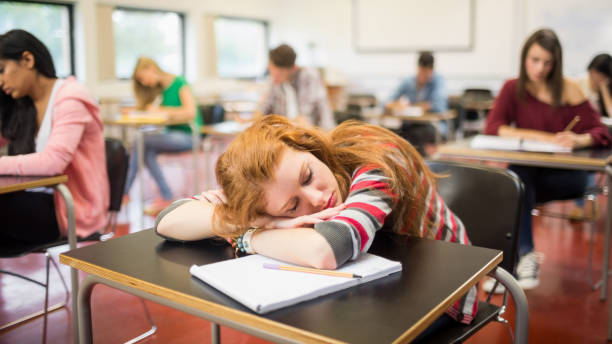More than 2 out of 3 students aren’t getting a healthy amount of sleep. The situation also seems only to be getting worse. As we get older, school starts earlier and earlier. This raises the question of whether students are getting enough sleep to function properly at school. Winter sports here at Green Level are about to begin, and for the past few weeks students have been getting up as early as 4 am for sports and athletics, even missing breakfast and losing hours of sleep.
We’re taught in school about how everyone needs around 9 hours of sleep to function properly throughout the day. The amount of sleep people need changes throughout their lives, but adolescents and high school students need around 8 to 10 hours of sleep. According to recent studies conducted by the CDC, the average high schooler gets around 6.5-7.5 hours of sleep each night, and 7 out of 10 (72.7%) students do not get enough sleep on school nights.
As teenagers, our bodies naturally cause us to feel tired later in the evening. But since we have to get up early in the morning for school, we can’t sleep in and make up for any needed hours of sleep. Chronic sleep deprivation can have a dramatic effect on a teen’s health and well-being. Their mental health, and academic performance can go downhill. This is not good, especially during high school which is an important time in your life before college.
The main reason why students need more sleep is phones. Any smartphones or other devices that are used before bed can reduce sleep time. We spend all day feeding our brains with new information, and when we sleep we can finally rest and turn our brains off, giving our brains a break. It’s like running a marathon, you start strong but then you finish the race tired, and without energy. When you finally get to rest, you feel much better.
There are several reasons why devices, especially phones, can cause you to get less sleep. The blue light emitted by our cell phones restrains the production of melatonin, the hormone that controls your sleep-wake cycle. It can be hard to restrain ourselves from using phones before bed, I understand. If it’s difficult, try keeping your phone at a safe distance from your eyes before bed.
According to Health 360, phones increase our alertness at night and decrease our alertness in the morning. When we scroll through our phones at night, our minds are engaged with the content we are consuming. This tricks our brains into thinking we need to stay engaged, which increases our alertness and can make us feel less tired. Since you scroll through your phone for an extra hour or two late at night, you’ll be more tired and less alert in the morning and for most of the day.
Late-night scrolling doesn’t just make you feel a little tired, but it can also lead to chronic sleep deficiency. But, what should you do if you don’t want to give up your phone before bed? But, studies show that if you stop using your phone 30 minutes before you go to bed, your quality of sleep will increase. You can also charge your phone in a separate room to make it less tempting to grab your phone and use it in the middle of the night.
Don’t only put phones to blame though, even if they do play a crucial role in sleep deprivation, the blame may fall on yourself. As you mature, your body and the obvious hormonal changes that transform teens into teenagers shift your production of melatonin. This is why sometimes we feel more awake at midnight than we do during dinner, according to Dr. Allison Baker, a child and adolescent psychiatrist. “The typical high school student’s natural time to fall asleep is 11 pm or later. We really need to adjust the environment instead of asking teenagers to adjust their physiology.” Teens try their best to make up the sleep they lose on weekends, some even sleeping up to 12 hours a night. That’s almost double what the average high school student gets on a school night. It’s natural for teenagers to feel sleep-deprived, and it’s not fun either. Ask a teen what their favorite place is, and they’ll most likely say their room or their bed.
We can also put the blame on school and the early school start times. Multiple studies have shown that most teens aren’t functional before 9 am. Many doctors and professionals may blame buses as well. Buses have to come early in most cases to get students to school on time, and they have to stay on schedule to get the middle schoolers and elementary schoolers to school too. Currently, winter athletics are about to begin here at Green Level (Men’s and women’s basketball, swim and dive, etc.). Student-athletes have to get up as early as 4 am to get to early morning practices and workouts.
Freshman Women’s Basketball and Flag football player Kaitlyn Jenkins says, “I have to wake up early in the morning and go to bed late at night. I don’t get a lot of time to do school work and I don’t get to go out with my friends anymore. It is a huge commitment but it’s also extremely rewarding despite the toll it takes on my health.”
With packed schedules and homework assignments, it can be hard to manage and get everything done while also getting a proper amount of sleep at night. Students stay up so late to finish their assignments, especially as they take harder classes that give them more work while also trying to balance their personal lives with their academic lives and performance in school.
Sleep is super important for your health, no matter how old or how young we are. According to the Sleep Foundation, we as humans need sleep to recharge. Sleep helps us with learning and memory consolidation, and allows our brains to register and organize memories. This is important, and you’ll need this, especially during the night before a big test. Sleep also helps with our emotional regulation, decision-making, problem-solving, and many other positive things.
Sleep schedules are important, and it’s important to keep them organized. Our bodies set a “biological clock” according to the pattern of daylight where we live. There are many different ways you can help manage your sleep schedule, such as cutting down on screen time before bed, being mindful of bright lights, exercising during the day, cutting off on naps, and drinking less caffeine. These are just a few ways you can establish an effective sleep schedule. The only thing you need to do is to go to bed at a reasonable time. As you try to go to bed early, you also develop good habits.
All in all, sleep is essential. For the sake of our health as high schoolers who have to get up early every day for school, we need to practice good sleep habits so we can learn and grow as students.












